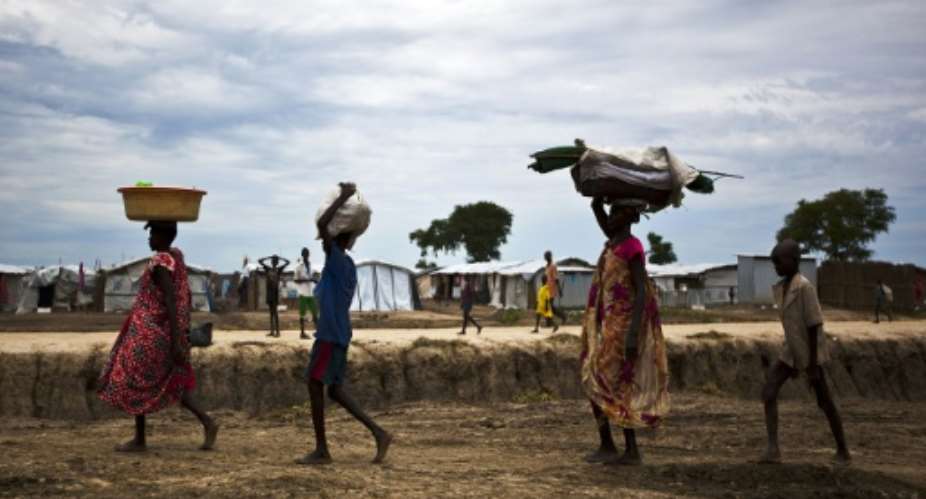London (AFP) - Progress in African governance has hit a plateau, while more than a third of African countries are backsliding, an annual index measuring key development factors showed on Monday.
Some 21 of the 54 states ranked, including five of the top 10, have deteriorated in overall governance performance over the last four years, the 2015 Ibrahim Index of African Governance found.
After rocketing ahead since 2000, progress on average across the continent has stalled since 2011, the data-based index showed.
"Africans overall are certainly healthier and live in more democratic societies than 15 years ago," said founder Mo Ibrahim, the Sudan-born telecoms tycoon, launching the 2015 index in London.
However, the statistics showed that "recent progress in other key areas on the continent has either stalled or reversed, and that some key countries seem to be faltering," he said.
"This is a warning sign for all of us. Only shared and sustained improvements across all areas of governance will deliver the future that Africans deserve and demand."
The index ranks countries according to 93 indicators grouped under four overarching categories.
There were overall improvements in human development, and in participation and human rights, but deterioration in sustainable economic opportunity, and in safety and the rule of law.
- Mauritius top, Somalia bottom -
This year's index includes Sudan and South Sudan for the first time, enough separate data having been amassed since South Sudan's secession in 2011, though both states are performing poorly.
The top five countries, scored out of 100, were Mauritius (79.9), Cape Verde (74.5), Botswana (74.2), South Africa (73.0) and Namibia (70.4), which overtook Seychelles.
The bottom five were Eritrea (29.9), Sudan (28.3), Central African Republic (24.9), South Sudan (19.9) and Somalia (8.5).
The top improvers since 2011 have been Ivory Coast (35th place, up 8.5 points to 48.3), Zimbabwe (44th, up 4.6 to 40.4) and Senegal (ninth, up 4.5 to 62.4).
Meanwhile the worst fallers were South Sudan (down 9.6), the Central African Republic (down 8.4) and Mali (30th, down 8.1 to 48.7).
"The quality of governance in Africa that had increased quite nicely until four or five years ago has stalled. This is a worrying development," Pascal Lamy, former director-general of the World Trade Organization, told AFP.
"Countries who have stronger institutions which are less corrupt and have free and fair elections are doing better economically and socially."
Abdoulie Janneh, a Mo Ibrahim Foundation board member and a former UN official, said Africa was generally on track to improving both its governance and its economic situation but progress had stalled.
"This is a wake-up call," he told AFP.
Ibrahim began compiling the index in 2006 in a bid to help countries measure and improve their performance.





 E-Cedi will be used as a weapon to fight money laundering and corruption — Bawum...
E-Cedi will be used as a weapon to fight money laundering and corruption — Bawum...
 Election 20204: Transfer power to us peacefully for your own good — NDC tells NP...
Election 20204: Transfer power to us peacefully for your own good — NDC tells NP...
 Voter registration: Don't bus minors to registration centres — Nana Akomea warn ...
Voter registration: Don't bus minors to registration centres — Nana Akomea warn ...
 Error in registration slip: Trust the Commission on its mandate — EC assure Ghan...
Error in registration slip: Trust the Commission on its mandate — EC assure Ghan...
 Ejisu by-election: NPP aspirant who projected less than 5% votes for Aduomi cong...
Ejisu by-election: NPP aspirant who projected less than 5% votes for Aduomi cong...
 Election 2024: Stolen BVR kits could be used to illegally register people – NDC ...
Election 2024: Stolen BVR kits could be used to illegally register people – NDC ...
 60% of SHSs taken off double track system – Dr Yaw Osei Adutwum
60% of SHSs taken off double track system – Dr Yaw Osei Adutwum
 Voter registration: We hope to hit over one million registered voters in Volta -...
Voter registration: We hope to hit over one million registered voters in Volta -...
 Akufo-Addo not obliged to disclose full KPMG audit report – Presidency
Akufo-Addo not obliged to disclose full KPMG audit report – Presidency
 ECG staff used ransomware to sabotage paperless system, can you imagine they eve...
ECG staff used ransomware to sabotage paperless system, can you imagine they eve...
